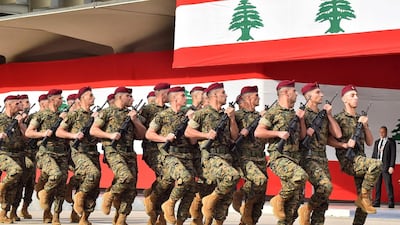The Lebanese military needs aid to help its soldiers survive the financial crisis, an army source said on Wednesday before a UN-backed donor conference.
Unlike earlier conferences to provide training, weapons or equipment for Lebanon's armed forces, the online meeting hosted by France on Thursday hopes to give the type of humanitarian assistance usually reserved for countries dealing with war or natural disasters.
"We are in need of food parcels, healthcare assistance" and other support, a military source told AFP.
"The devaluation of the Lebanese pound is affecting soldiers and they are in need of support. Their salaries are not enough any more."
Lebanon's economic crisis, which the World Bank has called one of the world's worst since the 1850s, has led the local currency to lose more than 90 per cent of its value on the black market.
The crisis has eroded the value of soldiers' salaries and cut the military's budget for maintenance and equipment, further threatening the country's stability.
A regular soldier earns about 1.2 million Lebanese pounds a month, which is $800 at the official exchange rate but only about $80 on the black market.
Towards the middle of last year, the army said it had scrapped meat from the meals offered to on-duty soldiers, because of rising food prices.
"We are doing the impossible to ease the suffering and the economic woes of our soldiers," army chief Gen Joseph Aoun said on Tuesday.
"We are forced to turn to allied states to secure aid and I am ready to go to the end of the world to procure assistance so that the army can stay on its feet."
About 20 countries, including the US, several EU member states, Gulf countries, Russia and China have been invited to take part in the conference.
Gen Aoun last month visited Paris, where he said the army could face even darker days without emergency support.
"The Lebanese army is going through a major crisis, which could get worse due to the deteriorating economic and social situation in Lebanon, which may worsen when subsidies are lifted," he said.
Gen Aoun was referring to a government plan to scrap subsidies on essential goods such as fuel and flour to support dwindling foreign currency reserves.
A source close to French Defence Minister Florence Parly on Wednesday said the crisis was alarming because the Lebanese military was the "key institution" maintaining security.
The army has highlighted "very specific needs" for milk, flour, medicine, fuel and spare parts for maintenance, the source said.
Aram Nerguizian, of the Centre for Strategic and International Studies and the Carnegie Middle East Centre, said the military had already lost more than 3,000 members since 2019, with 80,874 personnel at the start of this year.
"Morale is low, officers are increasingly demoralised," Mr Nerguizian said.
He said donors could provide "in-kind assistance that helps LAF personnel gain access to staple goods they would otherwise spend their now severely diminished salaries on", such as food, fuel and medicine.
But aid that supports salaries is "more difficult".
"For most of the LAF's western partners, there are laws and mechanisms in place specifically not to have aid used in that way," Mr Nerguizian said.
"Those systems are in place to prevent corruption, nepotism and a twisted form of dependence on foreign aid for the current portion of national defence spending."
The US remains the biggest financial backer of the Lebanese military, and increased funding for the army by $15m for this year to $120m.
France, Egypt, the UAE and Turkey are among the army's main food donors, while Iraq and Spain have offered medical assistance.


